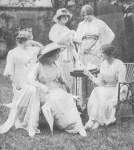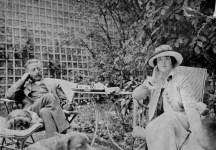A Last Minute Passenger
/Lady Lucy Duff-Gordon never planned to sail on Titanic. But with urgent business in New York, she needed the first ship available. With homes in London and Paris and a thriving fashion design business, she and her husband, Sir Cosmo Duff-Gordon, boarded the Titanic at Cherbourg, France. They registered as Mr. and Mrs. Morgan and occupied two first class cabins.
Born Lucy Christiana Sutherland, she married James Wallace at age 18 and had a child. When they divorced, she began a dressmaking business in 1888 to support herself. Her talent for creating unique and fashionable dresses led to her shop, The Maison Lucile, becoming one of the great fashion houses of London by 1900. Well-known clientele included the Duchess of York, who later became Queen Mary. Madame Lucile opened another shop in New York in 1910 and one in Paris in 1912.
Madame Lucile's designs, 1912
Sir Cosmo Duff-Gordon first became Lucy's business partner. They then married in 1900, giving her financial security as well as aristocratic connections.
In her autobiography, Discretions and Indiscretions, Lady Duff-Gordon remembered the last evening on the Titanic:
“We had a big vase of beautiful daffodils on the table, which were as fresh as if they had just been picked. Everyone was very gay, and at a neighbouring table people were making bets on the probable time of this record breaking run. Various opinions were put forward, but none dreamed that Titanic would make her harbour that night ...I had been in bed for about an hour and the lights were all out, when I was awakened by a funny, rumbling noise...”
She and Sir Cosmo boarded Lifeboat 1, along with her maid. The boat had a capacity of 40, but was lowered with only 12 people aboard, 7 crewmen and 5 passengers. It’s believed it may have been lowered quickly in order to make room for the ship’s two collapsible boats to be readied.
Later, when Sir Cosmo paid the crewmen, he and his wife were accused of bribing them to not go back for more passengers. The Duff-Gordons testified at the British inquiry and were vindicated. The crewmen in the lifeboat had decided it was too dark to go back for anyone, and Sir Cosmo had paid them five pounds each, not as a bribe, but to help them during their search for new employment.
Sir Cosmo and Lady Duff Gordon, 1914
Sir Cosmo died in 1931, and Lady Duff-Gordon’s business eventually collapsed. She died in 1935 at the age of 71 in a London nursing home, and is buried alongside her husband near London.
Lady Duff-Gordon



